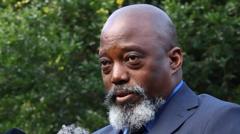The Democratic Republic of Congo (DRC) has notably prohibited the activities of the People’s Party for Reconstruction and Democracy (PPRD), led by former President Joseph Kabila, over claims connecting him to the M23 rebel faction that has captured significant territories in the country’s eastern regions this year. This ban follows Kabila's return to the DRC after spending roughly two years residing in South Africa, with reports indicating his arrival in Goma—an area that witnessed the M23 takeover earlier in January.
Having ascended to the presidency at age 29 after the assassination of his father, Laurent Kabila, Joseph Kabila presided over the DRC for 18 years. The Interior Ministry’s statement emphasized the party's "ambiguous attitude" regarding the ongoing M23 occupation while accusing Kabila of harboring enemies due to his return to Goma. Official declarations from Kabila's party have yet to surface.
In a turbulent political landscape, the DRC government has classified Kabila, now 53, as a high treason suspect and ordered the confiscation of his assets. Although he maintains his innocence regarding any affiliation with the M23, Kabila has refrained from addressing the government's recent allegations directly. Just before this controversy unfolded, he mentioned intentions to return to his homeland, and senior party representatives have disputed claims of his presence in Goma.
Kabila’s spokesperson announced that the former leader plans to address the nation imminently. Meanwhile, a spokesperson for M23 neither confirmed nor denied Kabila’s return, stating lack of opposition to his presence.
Kabila’s leadership history includes winning two elections, with his final term as president concluding in December 2016. His tenure was marked by reluctance to relinquish power, culminating in significant public unrest. Kabila continued to influence Congolese politics until 2019 when he handed power to Félix Tshisekedi following a contentious electoral process marred by allegations of impropriety.
His recent statements suggest a desire to return to the forefront of the DRC's political scene to aid in addressing the nation’s escalating institutional and security challenges. However, analysts underscore that longstanding ties to the M23’s leadership, previously allied to Kabila during his presidency, complicate his narrative. The memory of his father's historical rise to power, which began in the eastern regions during the late 1990s, looms as Kabila re-enters a volatile political arena marked by conflicts and rebellions.



















